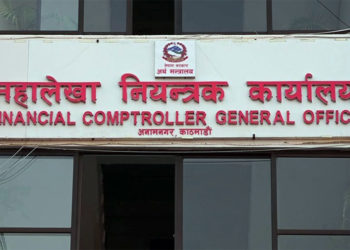KATHMANDU: Economic Digest offers a concise yet comprehensive overview of significant business happenings in Nepal, presented in easily digestible summaries.
The Public Procurement Monitoring Office blacklisted four builders for violating procurement rules, emphasizing the need for integrity in government spending.
Meanwhile, gold prices hit a record high of Rs 149,800 per tola due to rising demand amid economic uncertainty, with silver also increasing.
The Inland Revenue Office in Bhadrapur collected Rs 3.21 billion in the last fiscal year, slightly below its target due to reduced trade activities.
In an effort to manage banking liquidity, Nepal Rastra Bank plans to withdraw Rs 50 billion from the system.
Additionally, FNCCI President expressed optimism about economic growth following the recent government formation by Nepal’s major parties.
However, the IMF has warned of significant risks to Nepal’s economy from troubled savings and credit cooperatives, urging immediate reforms to prevent social unrest.
NEPSE soars by 54 points, exceeds 12 billion in turnover
The Nepal Stock Exchange (NEPSE) surged by 54 points on Wednesday, reaching 2,364.63 points, with trading volumes exceeding Rs 12 billion.
A total of 32,095,937 shares were exchanged among 306 companies, with 204 seeing price increases.
The non-life insurance sector led the gains, climbing 382.41 points, while all 13 sectors reported positive growth, with significant increases in hotel, tourism, life insurance, manufacturing, and trading sectors.
Notably, six companies’ share prices rose by over 9%, with four hitting the positive circuit limit.
Four builders/suppliers blacklisted for breaching procurement rules
The Public Procurement Monitoring Office (PPMO) has blacklisted four builders/suppliers, effectively barring them from engaging in any public procurement processes under Article 63 (1) of the Public Procurement Act, 2063.
This enforcement reflects the PPMO’s commitment to upholding transparency and integrity in government spending.
By imposing this penalty, the PPMO aims to deter malpractice and ensure adherence to procurement regulations, thereby safeguarding fair competition.
The blacklisting carries substantial consequences for the affected entities, impacting their ability to secure government contracts and potentially influencing their business viability.
Gold hits record high at Rs 149,800 per tola
The price of gold on Wednesday, soared to a record high of Rs 149,800 per tola, marking a substantial increase of Rs 2,000 per tola from the previous day’s rate of Rs 147,800 per tola.
Similarly, standard gold rose to Rs 149,100 per tola, up by Rs 2,000 from Rs 147,100 per tola.
Additionally, silver saw a price hike of Rs 20 per tola, reaching Rs 1,895 per tola compared to Rs 1,875 per tola the day before.
These sharp increases highlighted growing demand for precious metals amid economic uncertainty and inflationary pressures, with investors turning to gold and silver as safe-haven assets.
The surge also reflected global market dynamics and geopolitical tensions that influenced commodity prices worldwide.
While presenting investment opportunities, these record-high prices posed challenges for sectors reliant on these metals, potentially impacting production costs and broader economic stability, necessitating vigilant market monitoring and strategic risk management.
Govt. issues 73-point guideline for budget enforcement
The government has issued 73-point guidelines for the enforcement of the budget. The guideline is for the directive to all ministries, province and local governments.
The Finance Ministry made public the circular that has aimed at frugality in budget spending and effectiveness. Authority of budget spending, approval of project and allocation, project handover and enforcement, budget transfer, amendment and reporting, fiscal transparency, accountability, monitoring are the agenda included in the guidelines.
Inland Revenue Office Bhadrapur achieves Rs 3.21 billion fiscal year revenue collection
The Inland Revenue Office in Bhadrapur collected Rs 3.21 billion in fiscal year 2080/81 BS, surpassing last year’s collection by Rs 195.29 million.
Revenue from income tax amounted to Rs 1.70 billion, with additional sums from rental income tax, interest, value added tax (Rs 1.29 billion), and excise duty (Rs 644.65 million).
Despite setting a target of Rs 3.79 billion, only 84.57 percent was achieved due to reduced trade and business activity nationwide. Specifically, VAT income decreased due to lower payments from district development projects compared to the previous fiscal year’s collection of Rs 1.38 billion.
NRB to withdraw Rs 50 billion to address banking liquidity
Nepal Rastra Bank (NRB) has planned to withdraw Rs 50 billion from the banking system on Wednesday to manage excess liquidity.
The withdrawal occurred through a 21-day bidding period, with banks and financial institutions invited to submit bids by 3 PM on Wednesday.
Bidders proposed amounts strictly between Rs 100 million and Rs 50 million without any remainder.
Furthermore, Rs 950 million obtained from the bidding process is yet to mature. On Tuesday, NRB collected Rs 372 billion from banks and financial institutions at a three percent interest rate via the Standing Deposit Facility (SDF).
FNCCI President optimistic as Nepal’s major parties form government
FNCCI President Chandra Prasad Dhakal highlighted that the recent formation of a government by Nepal’s two major parties has rejuvenated investor, industrialist, and public confidence.
Dhakal emphasized that political and policy instability had previously hindered both domestic and foreign investment. He expressed optimism that the collaboration between these parties would bolster investor trust and stimulate economic activities.
IMF warns of risks to Nepal’s economy from troubled cooperatives
The International Monetary Fund (IMF) has highlighted risks posed by failing savings and credit cooperatives in Nepal, which could lead to social unrest if not addressed promptly.
Several cooperatives have collapsed recently, resulting in losses of client savings and local disturbances.
The IMF recommends urgent reforms and a comprehensive strategy to stabilize the sector, emphasizing improved governance, regulatory oversight, and enforcement.
Immediate measures include halting new cooperative registrations, tightening regulatory requirements, and establishing a licensing framework. The IMF urges coordinated action to protect depositors and prevent further economic fallout.
(Compiled and prepared by Srija Khanal)
Economic Digest is a daily morning economic digest, basically relatable summations of the most important business news, and happenings from Nepal into easy-to-understand summaries.









Comment